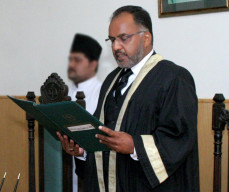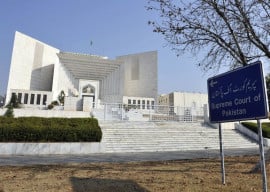
The Supreme Court has held that the confessional statement of a co-accused needed independent corroboration even at the stage of bail.
“This court has, in several cases, held that the conviction of a co-accused cannot be recorded solely on the basis of confessional statement of one accused unless there is also some other independent evidence [corroborating the confessional statement],” read a four-page order authored by Justice Syed Mansoor Ali Shah while granting post arrest bail to an accused in a corruption case.
“The principle ingrained in Article 43 of the Qanun-e-Shahdat is applied at the bail stage and the confessional statement of an accused can lead the court to form a tentative view about [the] prima facie involvement of his co-accused in the commission of the alleged offence,” it added.
“But as in the trial, at the bail stage also, the prima facie involvement of the co-accused cannot be determined merely on the basis of [a] confessional statement of other accused without any other independent incriminating material corroborating [it].”
Read: Delay in filling two SC posts raises eyebrows
The order, however, noted that the bench was fully cognisant of the well-settled principle that at the bail stage the court was not supposed to make deeper examination and appreciation of the evidence collected during investigation or to conduct anything in the nature of a preliminary trial to determine the accused's guilt or innocence.
“However, for deciding the prayer of an accused for bail, the question whether or not there exist reasonable grounds for believing that he has committed the alleged offence cannot be decided in vacuum. The court, for answering the said question, has to look at the material available on record when the bail is applied for and be satisfied that there is, or is not, prima facie some tangible evidence which, if left unrebutted, may lead to the inference of the guilt of the accused,” the order read.
According to the facts of case, Waqas Aslam, a co-accused, in connivance with the officials of the office of Controller Military Accounts (CMA), fraudulently withdrew an amount of Rs52.25 million through 33 fake bills of Central Ordinance Depot Rawalpindi, in favour of his four firms and deposited in five different bank accounts he operated.
It was mentioned in the FIR that the role of the other persons involved in the fraud would be thrashed out during investigation.
The co-accused implicated the present petitioner, Muhammad Sarfraz Ansari, an ex-official of the CMA, during investigation in his confessional statement recorded under Section 164 of the Code of Criminal Procedure, 1898 (CrPC), for being his partner in, rather the mastermind of, the whole fraud. Muhammad Haider Altaf, an official of the CMA, was also found to have abetted in the commission of the alleged offences, and was arrested in the case during investigation. He has, however, been admitted to post arrest bail by the high court on November 12, 2020.
Read more: Number of pending cases in SC nears 49,000
The bench in its order noted that the co-accused, Waqar Aslam, stated in his confessional statement that the fake bills were prepared, and 80% of the withdrawn amount was taken by the present petitioner. “However… the recovered data from the mobile phone does not implicate the petitioner of the act besides it relates to the sale tax invoices and contractor bills of a firm, namely, Ali Traders, and not to the firms owned by the co-accused, Waqar Aslam, in whose favour the alleged fake bills were encashed,” it added.
“The learned counsel for the State also failed to refer to any material to substantiate the finding recorded by the investigating officer that the petitioner, as a result of the above fraud, had amassed wealth and purchased two apartments in top housing schemes in Rawalpindi. We, therefore, find that the material currently available on record of the case is not sufficient to connect the accused with the commission of the alleged offences, and there are no reasonable grounds for believing that he has committed the alleged offences; but there are sufficient grounds for further inquiry into his guilt in terms of Section 497(2) of the CrPC.”
The court converted the petition into an appeal and extended the concession of bail to the petitioner subject to his furnishing a bond in the sum of Rs500,000 with two sureties.










1732549780-0/Speaker-Na-photo-22_04_2014-(1)1732549780-0-270x192.webp)











COMMENTS
Comments are moderated and generally will be posted if they are on-topic and not abusive.
For more information, please see our Comments FAQ